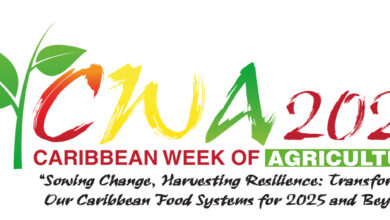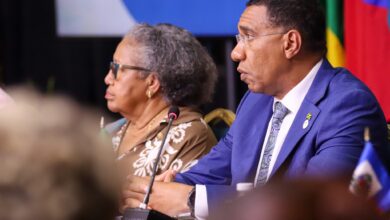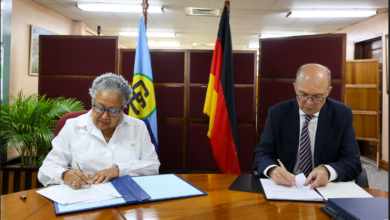CHRIST CHURCH, BARBADOS – Announced last year, leaders from thirty-four
countries in the Americas were called to focus and deliberate on three principal
topics, inter alia: combating poverty, promoting social development, and
strengthening democratic governance, at a Special Summit in the city of Monterrey,
Nuevo León, Mexico, January 12 to 13, 2004. Caribbean leaders were amongst the
invited Heads of State.
The Special Summit’s purpose was slated as “advancing the implementation of
measures to combat poverty, to promote social development, to achieve economic
growth with equity, and to strengthen governance in […the hemisphere’s…]
democracies”. Heads of State agreed to these three broad goals, in their final
declaration. They all signed the Declaration of Nuevo León, January 13.
Allied to bringing into sharper focus the current economic, social and political
challenges facing the hemisphere, the summit provided an opportunity for Heads of
State to meet, ahead of a scheduled gathering of Western hemisphere leaders in
2005. Fourteen new leaders have taken office since the Third Summit of the
Americas, in Quebec City, Canada, held in 2001.
Prior to the two-day summit, indications were the Americas-wide trade accord, the
Free Trade Area of the Americas (FTAA), currently under negotiation, would not
feature on the summit agenda. However, it emerged as a topic of debate. At the
summit, certain leaders voiced their opposition to hemispheric trade issues being
incorporated into the Declaration; they challenged links US President George Bush
made, at the meeting, between trade and poverty eradication.
The final declaration welcomed progress achieved, to date, towards the
establishment of a FTAA accord. However, common understanding has been elusive
over the deadline for hemispheric trade negotiations. There are lingering
uncertainties over it being definitive or merely a ‘goal’.
In recent months, the free-trade pact has met with impasse, which subsequently
prompted a technical and political review of the process. Progress after the Seventh
Ministerial meeting, convened November 2002, had been affected by a number of
technical difficulties arising from negotiations. The main issue of contention was,
and continues to be, the treatment of agricultural subsidies – in particular domestic
supports and export credits, in the hemisphere. At the Special Summit, some
leaders were critical of US agricultural policies. The Declaration of Nuevo León
acknowledges that liberalization of trade of agricultural products is vital to the
development of agriculture in the hemisphere, and reaffirms Heads’ commitment to
trade negotiations to “promote effective access to markets”.
Fundamental differences, in FTAA negotiations, also exist over the scope of
application of negotiations in other areas, such as Services, Investment, and
Subsidies and Antidumping. With just over twelve months before the scheduled end
of negotiations, January 2005, this has left the text of the draft FTAA pact subject to
disagreement.
The Declaration of Nuevo León takes note of what it describes as “the balanced
results of the VIII […FTAA…] Ministerial Meeting”. It supports the framework and
calendar adopted for concluding negotiations for the FTAA by the “established
timetable”, with no specific date mentioned. At the FTAA talk’s Eighth Ministerial
Meeting, in Miami, last year, there was agreement to revisit the scope and structure
of the accord.
The vision of the FTAA, which forms the core of the Eighth Ministerial Meeting
Declaration, reaffirms commitment to a comprehensive and balanced Agreement,
and introduces an element of flexibility into negotiations; which seeks to
accommodate the needs, sensitiveness and ambitions of all FTAA countries. The
vision, which represents a compromise between US and Brazilian ambitions,
introduces a two-tiered structure into the negotiations. Countries will negotiate a
common and balanced set of rights and obligations in all nine negotiating areas,
which will be applicable to all of them. However, those that so choose can agree to
additional obligations and benefits, on a ‘plurilateral basis’.
Central to the vision is the principle of ‘appropriate balance of rights and obligations
where countries reap the benefits of their respective commitments’. Director-
General of the Caribbean Regional Negotiating Machinery (RNM), Ambassador Dr.
Richard Bernal, who attended the Special Summit, has stressed that CARICOM had
expressed strong reservation to this latter condition, noting that it calls into question
the application of the fundamental principle of differentiated treatment for smaller
economies in the negotiations. The Ambassador underscored “CARICOM sought and
received the political assurance of all delegations that special and differential
treatment for smaller economies remains a fundamental principle of the FTAA and
that the approach set out in the vision is subject to asymmetries to accommodate
the treatment of smaller economies”.
The practical application of the vision is yet to be worked out by the FTAA Trade
Negotiations Committee (TNC), which has been instructed to deliver detailed
mandates to the Negotiating Groups by its Seventeenth Meeting, scheduled to take
place from February 2 to 6.
The Special Summit is set to be followed by the Fourth Summit of the Americas, in
Argentina, in 2005. This meeting is expected to focus on the FTAA process.
———————————————————————
For More Information Contact:
Nand C. Bardouille
Tel: (246) 430-1678
email: nand.bardouille@crnm.org
CARICOMFree Trade Area of the Americas (FTAA) SecretariatMexicoPress ReleasesTradeUnited States of America





